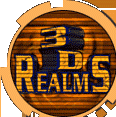The Apogee Legacy #6 - Mike Voss
Today our "Apogee Legacy" Interview series continues with its newest edition, this time with Mike Voss, author of the 1994 game, "Hocus Pocus". Mike only did one title with us, but it was a memorable one; it was a great entry in Apogee's long line of sidescroller titles. Mike (who we have no pictures of) no longer works in the game industry but was very happy to be interviewed about his game with us now 12 years ago.
Past Pioneers of the Shareware Revolution
Issue #6 - Mike Voss
1) How did you first come in contact with Apogee?
I was playing around with the idea of writing a shareware game around 1991. I started with a graphical adventure style game that ended up tired and boring after a while. Then I was inspired by Duke Nukem! I studied the game and figured that I might be able to tackle a similar style game. I was somewhat pessimistic about the idea of the shareware marketing model paying off until, in a local specialty magazine store, I came across "shareware magazine" and thumbed through it. I read in an article that Apogee was receiving about 300 orders per day.
I began to devote a large amount of time to programming. I created a game called Clyde's Adventure and tossed it into the shareware arena. The game was a modest success. I could almost make a small and very modest living. Very very modest. After a few months I received a letter from Scott Miller suggesting that possible fame and fortune was on my doorstep. Apogee offered to publish my next game. I said okay.
2) Was there a reason you decided to work with Apogee, say versus going on your own or working with another company?
Given that Clyde's Adventure was a small, run and hop type game, it wasn't as if Electronic Arts and Sierra was banging on my door. Further, I never really intended to make a career out of programming games. Apogee was offering to market my work and toss a chunk of the profits my way. It was a win-win proposal. I worked with Apogee because they asked me to.
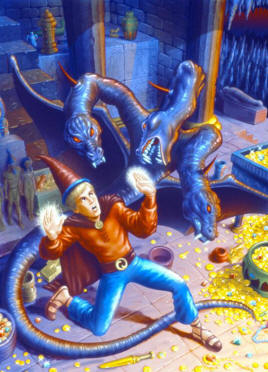
|
| Hocus Pocus Game Manual Artwork |
3) Looking back, was there anything Apogee could have done better, regarding the marketing and distribution of your game?
Hocus Pocus was released immediately following the release of Raptor. I saw full page ads in gaming magazines for Raptor. I saw no advertising for Hocus Pocus. At the time I felt cheated. Apogee always presented their company image as "not like the other companies" and that all games are given equal attention. I recall hearing George Broussard mention to me that "advertising does not do much to improve sales." I couldn't believe that he was telling me this. I understood the logic: Raptor sold better than Hocus Pocus. A dollar spent advertsing Raptor would always bring in more money that a dollar spent advertising Hocus Pocus. It was simple business sense not to spend money advertising my game. Still, I felt that I was unfairly treated. I got over my resentment on a recent Dr. Phil show, perhaps you saw it.
4) Do you think your game was made better or worse by working with Apogee?
Apogee absolutely made my game better. They had contacts for sound engines, music, art, etc. I hammered out Hocus Pocus on a 386 20 Mhz machine with an old 10 meg hard drive. My monitor died on me and for a few weeks I was using an old sony 6 inch black and white monitor. You might go so far as to say that my resources were on the lean side.
5) Apogee had a policy of letting the designer or studio retain full intellectual property rights to their game. Nowadays, it's rare to find a publisher who allows this, especially if the publisher is providing the funding. Do you believe that it's best for the creator to retain IP rights? Why or why not?
Given that I have kept my head out of the computer gaming business for the last ten years, I don't feel that I'm qualified to give a good opinion about this issue.
5a) And if applicable, have you benefited from retaining ownership of your own IP?
No response to question.
5b) Do you think there'll ever be a sequel to your game(s)?
Hocus Pocus 2: With a Vengence.
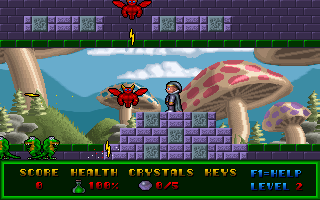
|
| Screenshot from final version of Hocus Pocus |
6) Is there any story/incident that stands out as interesting during your time associated with Apogee?
The best time I had working with Apogee was meeting Jim Dose. Jim was working on the Apogee sound system in New York and I would have long phone conversations with him on many occasions. He later ended up working with Apogee in Texas. Although we never met in person, Jim was one of the best people I met in the gaming industry.
7) Apogee was an early pioneer in terms of teaming up with external designers and studios, and continues to do so even to this day (currently working with Human Head Studios on Prey). Why is it that so few other studios do this (mentor and fund outside projects with lesser known teams)?
Companies tend to continue with what works for them. Apogee started out by working with outside companies so it's no surprise that they continue this practise.
8) What the biggest difference in the industry nowadays versus when you worked with Apogee?
Again, I have been out of the gaming industry for so long, I don't know too much about the changes that have occurred.
9) What have you been doing since your time with Apogee?
Shortly after I started developing Hocus Pocus, I got married. Apogee advanced us $5,000.00 to help us financially, the advance was free of interest for more than a year. Kudos to Apogee for a class act.
We now have two children, Jacob, who is six and Heather who is four. We have a small house in the suburbs and lead a comfortable and calm existence.
Like 98% of programmers, I began to do commercial web programming during the dot com bubble until it popped. My hobby now is playing with my kids and hoarding Google stock.
In a rather strange career move, I am currently completing my training to become a paramedic in the spring. Adios, programming.
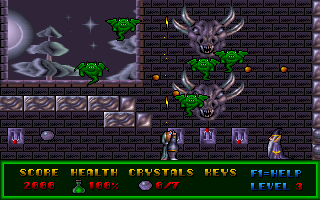
|
| Screenshot from final version of Hocus Pocus |
10) If you're no longer making games, have you thought about returning to this industry? If not, why not?
Sheesh, no. The industry now is so different from the small development teams that I worked with. If I'm not the star of the show, so to speak, then I don't want to be involved. Nowadays, to be a star, you need an IQ like a phone number. I dropped out of the game programming industry after id software wrote a little ditty called Doom. I could not compete with that. I tried for a little while, and just when I was getting the 3D concepts, they released Quake!
11) Looking back, are there any missed opportunities that you wish you'd have jumped on?
I believe that all things happen for the best, good or bad. We learn from bad experiences and profit from good experiences. Regret is like driving while looking in the rear view mirror.
12) Other than your game(s), what's your favorite game released or produced by Apogee (or 3D Realms)?
Halloween Harry is my favorite Apogee game.
12a) And what's your favorite 2-4 games released by anyone else?
Civilization
Doom I and II
All MS Flight Simulators
All Sim City's
13) Is there anything else you'd like to add about your time here or to fans of your title(s)?
My deepest appreciation goes out to everyone who played and enjoyed Hocus Pocus. Even the ones who enjoyed the pirated copies. (George will hate me for saying that.)
I'd also like to thank Scott Miller, George Broussard, Todd Replogle, Jim Dose, Jason Blochowiak and my beta testers, Andre Foucault and Chris tenDen.
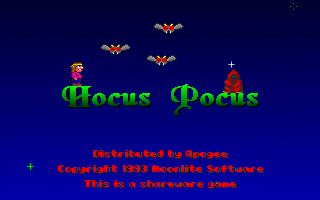
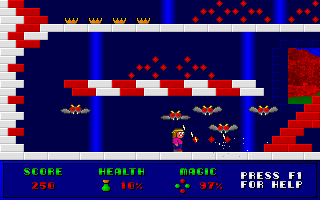
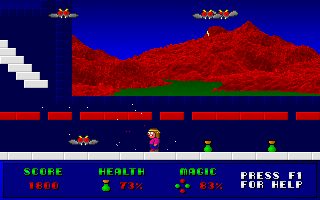
Screenshots from early build of Hocus Pocus in March 1993.
Thanks to Mike for taking the time to send in his interview. We still sell Mike's game, and it's still a good sidescroller game. You can check out the shareware version on the downloads page, or you can buy the registered version here. There's also some more information about Hocus Pocus on our catalog page for it here.
Make sure and tune in again next Monday morning, when we bring you the next in our Legacy Interview series.
Posted by Joe Siegler on February 13, 2006 at 12:21 PM | Permalink
| Discuss this story on our forums
News Categories: About 3DR / 3DR Staff | The Apogee Legacy
